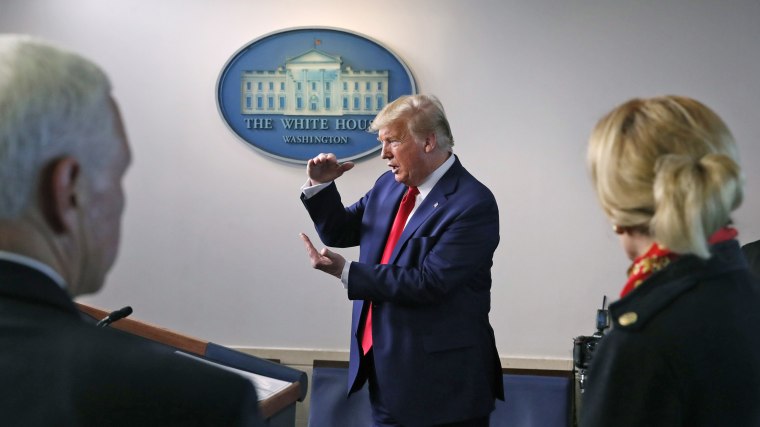President Donald Trump, who was diagnosed with Covid-19 on Friday, has repeatedly downplayed the pandemic or endorsed theories dismissing its severity. Here are a few examples:
CHINA
As the virus was beginning to spread at the start of the year, having emerged in the Chinese city of Wuhan late December, Trump told CNBC in January: "We have it totally under control. It's one person coming in from China, and we have it under control. It’s going to be just fine."
The same month he thanked the Chinese leader Xi Jinping in a Tweet for "working very hard to contain the coronavirus" and said that the U.S. "greatly appreciates their efforts and transparency. It will all work out well."
Relations between China and the U.S. have since dramatically soured, with Trump and his administration angering Beijing by referring to the disease as the "China virus" and last month in remarks delivered to the United Nations' General Assembly, Trump said forcefully: "We must hold accountable the nation which unleashed this plague onto the world, China."
MASKS
Trump has frequently downplayed the importance of wearing a face mask to stop the transmission of the virus. In April, at a White House briefing he told press: "With the masks, it's going to be really a voluntary thing. You can do it, you don't have to do it. I’m choosing not to do it, but some people may want to do it and that's OK."
Adding: "I don't see it for myself, I just don't."
Although Trump subsequently went on to don a face mask at public events and on the campaign trial, at the first presidential debate on Tuesday he taunted Democratic presidential nominee Joe Biden for putting one on so regularly.
"I don't wear masks like him. Every time you see him, he's got a mask. He could be speaking 200 feet away from them and he shows up with the biggest mask I've ever seen," Trump said.
Despite this, he produced a mask from his pocket during the debate against Biden and said, "I wear masks when needed. When needed, I wear masks."
Health professionals say that face coverings are key to preventing the virus from spreading.
DENIAL
Trump, like other world leaders, faced criticism for not reacting more swiftly to shut down the country on the outbreak of the pandemic. Trump has consistently said that acting early to stop flights from China and later Europe saved countless lives.
"It’s going to disappear. One day, it's like a miracle, it will disappear," he said in February, with critics accusing him of being in denial about the gravity of the disease.
Trump also repeatedly conflated the coronavirus with the seasonal flu and said that cases would decrease as the weather warmed up, which has not occurred.
In September, as the U.S. exceeded 200,000 deaths, Trump said: "It affects virtually nobody. It's an amazing thing. It affects ... elderly people with heart problems and other problems — if they have other problems, that's what it really affects, that's it."
During Tuesday's debate, Biden said Trump's idea that "everything's gonna be fine tomorrow" was simply "not rational."
Download the NBC News app for breaking news and politics
REMEDIES
Trump raised eyebrows in May when he touted the benefits of the antimalarial drug hydroxychloroquine, a medication he promoted as a preventative or curative treatment for the coronavirus, even as evidence piled up that the drug may cause more harm than good.
Trump said he had completed a two-week course of the drug. "Finished, just finished," he said in an interview on Sinclair Broadcasting, "And by the way, I’m still here."
In April he also startled scientists by suggesting the possibility of an "injection" of disinfectant into a person with the coronavirus as a deterrent to the disease. He also suggested using light "inside the body" as a possible remedy.
"So supposing we hit the body with a tremendous — whether it's ultraviolet or just a very powerful light. ... And then I said, supposing you brought the light inside the body, which you can do either through the skin or some other way, and I think you said you're going to test that, too."
Medical professionals, were quick to challenge the president's "improper health messaging."
Pressed later about the issue, Trump said he was not encouraging people to ingest disinfectant and portrayed his remarks as sarcasm.
Trump, 74, is at high risk due to his age and because he is considered overweight. He has remained in apparent good health during his time in office, but is not known to exercise regularly or to follow a healthy diet.
Trump has held large campaign rallies with thousands of people in recent weeks and has sought to project a return-to-normalcy message this summer.
In pre-taped remarks at a charity dinner Thursday night, he said the end of the pandemic was in sight.

